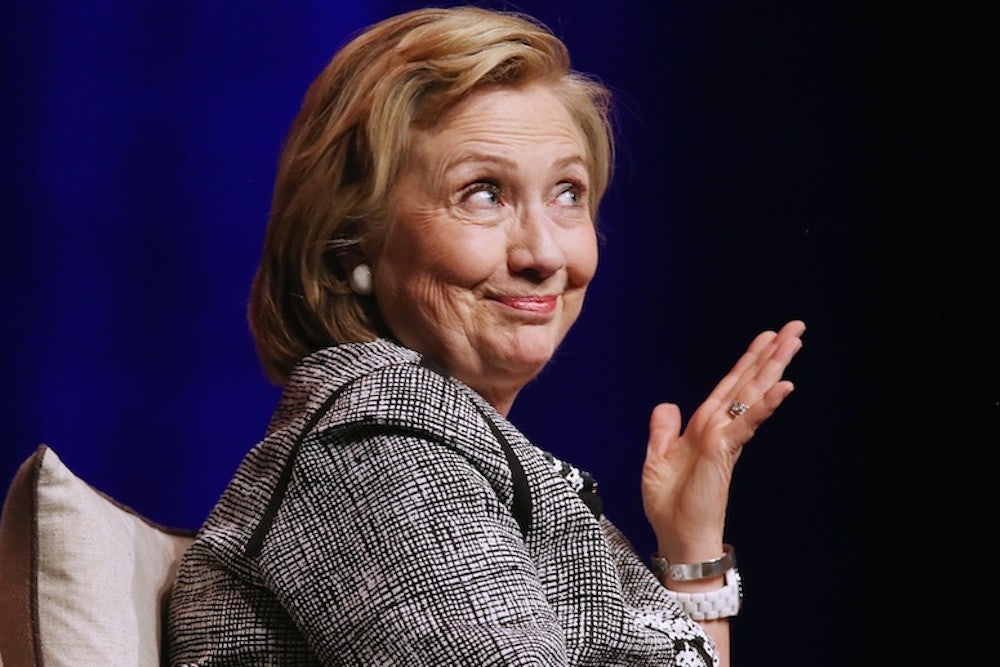The downside, and the upside, and the other downside of Hillary Clinton's overwhelming popularity among Democrats, and the related likelihood that she will avoid a divisive primary campaign, is that she's absorbing a tremendous amount of partisan opposition far ahead of her expected official candidacy. Her status forces Republicans to expend ammunition earlier than they'd ideally like, but it also carries the potential to weaken her favorables—to puncture her aura of inevitability—and a risk that she'll make an irreparable error on the public stage.
There's a mitigating corollary to that latter risk, which is that Republicans have a tremendous incentive to treat every misstep or perceived misstep as a grave, self-inflicted wound, whether that's really the case or not. As Clinton has traveled the country promoting her book Republicans have filtered her every utterance through their gaffe-o-meters, hoping a new blunder will crowd each news cycle. In the process, they've successfully fostered the narrative that Clinton's political chops are rusty, and her instincts ill suited for the current political moment.
On the right, the result is a sincere but mistaken belief that Clinton's candidacy is tanking. That she's an informidable opponent. An all but vanquished foe.
The latest episode reinforcing this belief occurred Saturday, during an interview with the Guardian, when Clinton attempted to explain why her personal wealth isn't a drag on her credibility as an advocate for addressing economic inequality.
"[T]hey don't see me as part of the problem," she said, "because we pay ordinary income tax, unlike a lot of people who are truly well off, not to name names; and we've done it through dint of hard work."
Count me among the many who think she could learn a thing or two from the current president, who is also a rich person, about how to publicly grapple with the apparent—though not genuine—contradiction between being wealthy and speaking to the concerns of the poor and middle class. It is possible to make a politically resonant case for noblesse oblige, and I assume she'll eventually figure that out. Count me also among the many who believe that Bill Clinton's substantive record on this score is pretty mixed.
But if Republicans really think Hillary Clinton's current tone deafness is going to make her the Mitt Romney of 2016, then they both fundamentally misunderstand Romney's actual liabilities as a candidate, and will likely remain ill prepared for the welcome awaiting the party's policy agenda, which remains fundamentally plutocratic. In fact, they appear to have completely glossed over the big tell embedded in Clinton's comments.
Obviously, it remains inadvisable for politicians to be simultaneously rich and out of touch. Still not exactly two great tastes that taste great together. I imagine that's the warning Elizabeth Warren intended to convey in her brutal but subtle response to Ruth Marcus' question about Clinton characterizing her family's former debts as tantamount to being "dead broke."
But Romney's weaknesses ran much deeper than tone-deaf asides about close friendships with NASCAR team owners, or a car elevator. His unfamiliarity with material deprivation was badly compounded by his devotion to an agenda (and a moral belief system) that would have people like him contributing less to the general welfare, and everyone else contributing more. That mapped neatly on to a basically correct, broader perception that the wealthy and powerful use their considerable influence above all else to help each other. Being a tribune for that class was Romney's real liability—not the magnitude of his wealth, or his inability to discuss personal financial matters with humility.
Nearly all viable presidential candidates are extremely rich. Obama is himself quite rich, though not exactly Kennedy/Bush/Kerry/Romney rich. The next GOP nominee might not be quite as cartoonish a plutocrat as Romney, but he will almost certainly be wealthy, and, crucially, will almost certainly promote an agenda that would exacerbate economic inequality. When Clinton said "we pay ordinary income tax" she wasn't just taking a gratuitous jab backwards at Romney for paying taxes at a sub-15 percent rate. She was presaging an agenda that will almost certainly call for eliminating or reducing tax preferences that allow an entire class of people of great wealth to reduce their effective tax rates. I don't know if she'll propose jacking up the capital gains tax, or closing the carried-interest loophole. I don't know if she'll target individual tax loopholes, or advocate for capping tax expenditure benefits or anything about what her economic agenda will look like. But I am 100 percent confident it will include some measures along these lines, and nearly as confident that the Republican candidate will oppose it in every particular.
This is the GOP's core problem. Clinton's gaffes don't really solve it for them. These jabs at her are perfectly defensible. But if they betray a belief that the political problems with their agenda are superficial, or can be neutralized by a less imperfect messenger, then they are exposing their own liability in an attempt to exacerbate one of Hillary's.
